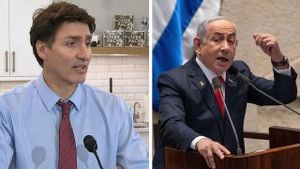After the election of Donald Trump, the political atmosphere surrounding the January 6th Capitol riots is heating up once more. The prospect of pardons for those involved looms largely, reigniting conversations about the ramifications of his potential decisions as he inches closer to the White House again. The former president, known for his controversial remarks and actions, has explicitly stated he would prioritize rectifying what he calls injustices against his supporters who stormed the Capitol, branding them as "hostages" and "patriots".
Throughout his campaign, Trump has reiterated his intention to pardon those convicted for their roles during the insurrection. An incident on January 6, 2021, saw many supporters of the then-president violently disrupt the certification of Joe Biden's electoral victory. This unprecedented act raised questions about the fragility of democratic processes and the extent to which one leader's words could incite such chaos.
Despite his claims, which characterize these rioters as freedom fighters, many legal experts and political analysts caution against what could be seen as blatant favoritism or the undermining of the justice system. U.S. District Judge Carl J. Nichols, appointed by Trump himself, expressed concern over the potential for blanket pardons. Before the most recent election, Judge Nichols stated, "Anything close to wholesale pardons for these actions would be beyond frustrating and disappointing." His words reflect the growing apprehension among those who believe accountability must prevail.
The dramatic upheaval on January 6 left many questioning the future of American democracy. With Trump possibly resuming office, those seeking pardons are hopeful, but wary. They include individuals like Edward "Jake" Lang, who faces federal charges for assaulting police officers during the riot. Lang's situation highlights the tension between punishment and presidential mercy, particularly concerning political motivations.
Many Americans are closely watching the developments around these judgments. Trump has framed his promised pardons as part of his broader campaign platform, tapping deeply emotional veins of support among polemical voters. His narrative, which casts the events of January 6 as noble missteps rather than criminal actions, provides him with fertile ground to appeal to his base. Supporters have echoed his sentiments, framing the issue as one of justice and wrongful persecution.
Observers wonder how this situation will play out should Trump return to the presidency. Senators and legal authorities may feel increased pressure from constituents who could view any actions taken by Trump to pardon individuals involved as reinstatement of privilege for violence. Not only does this create potential backlash against the government, but it also places significant strains on legal proceedings historically viewed as independent and unbiased.
Political strategist Mark Jones commented on the implications: "Trump's promises of pardons resonate strongly within his base but also raise concerns from moderates who fear for the integrity of our legal system. It plays to a narrative he has emphasized throughout his political career—that he alone can rectify grievances and injustices, true or perceived.”
This narrative could lead to significant political fallout, not only for Trump but also for candidates aligning closely with him. With numerous upcoming elections, including mid-terms and the national competitive Presidential race, the fractioning within the Republican Party is likely to deepen, splitting traditionally conservative voters who may feel uncomfortable endorsing violence.
Interestingly, Trump's talk of pardons also stirs anxiety among Democrats who worry about solidifying base support and the potential for retaliatory action, should Trump win again. Political analysts suggest this might lead to strategic shifts as both parties assess the potential fallout of providing pardons for those involved in the Capitol riot.
Indeed, the intricacies of these upcoming pardons—if they happen—could shape the political narrative for the next several years. They will likely set the tone for relations between the parties and impact public perception of the judiciary's independence.
These discussions highlight the cultural rift within the United States surrounding the January 6 events and reflect widespread concerns about the lengths to which some might go to defend the integrity and resolve of democratic institutions. Whether pardons feature prominently on Trump’s agenda remains to be seen, but the conversations taking place today are bound to echo politically for years to come, engaging citizens on both sides and sparking heated debates.
For individuals impacted by the insurrection—both directly and indirectly—the outcome feels personal. Participants hope to return to their lives post-pardons, yet others feel the ramifications of justice delayed. The societal divides become more pronounced without decisive actions taken by leaders amid calls for accountability.
On the ground, this political saga fuels grassroots movements both for and against Trump’s potential actions. Advocacy groups mobilize; supporters rally, and dissenters express their concerns through protests and political demonstrations. Public engagement is at fever pitch as individuals ponder the ramifications of mercy intertwined with legally defined punishments.
Based on Trump’s history and rhetoric, many speculate he will follow through on his promises to his loyalists, though the ramifications are unclear. The language of patriotism can wield significant power but could also incite backlash from those opposing the original message; those who decry the violence from the Capitol; insisting it was not representative of America’s values.
The reality of this situation reveals complex layers of political discourse, each intertwined along lines of federal law, political ideology, and basic tenets of American democracy. The turbulent history surrounding Trump’s presidency hints at more heated debates on the horizon, keeping citizens engaged with questions of justice, identity, and ideology.
Should Trump secure the presidency again, and he moves to enact these pardons, it might not only craft his legacy but also elicit broader, systemic changes, challenging what has come to be accepted as the standard of legal accountability within U.S. democracy. The story remains to be written, with twists likely to grip the nation as we head toward the next chapter of history.



